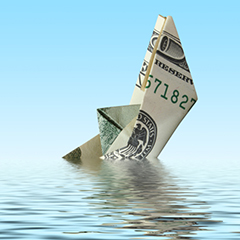Lost Profits or Lost Value of the Business?
May 8, 2017 | Business Plans, Valuations
 Let’s say that Maine Delicious Lobster Company loses its contract to deliver lobster for its primary customer, Good Maine Sandwich Company. Furthermore, the contract loss was due to an alleged breach by Good Maine Sandwich Company. The lobster company sues the sandwich company for damages.
Let’s say that Maine Delicious Lobster Company loses its contract to deliver lobster for its primary customer, Good Maine Sandwich Company. Furthermore, the contract loss was due to an alleged breach by Good Maine Sandwich Company. The lobster company sues the sandwich company for damages.
Or wait, should Good Maine Sandwich Company sue for loss of business value? Can it sue for both?
Those are questions that arise frequently in the context of damages litigation. Occasionally the courts have allowed both lost profits and the loss in value of the business. But usually only one or the other is permitted. Frequently, an expert can provide valuable input to the attorney on the proper measure of damages or lost value of the business for the situation at hand.
The basic difference between the two is that lost profits generally apply to a finite period of time, after which the business returns to normal. In the case of a loss of business value, the loss will continue into perpetuity.
Therefore, in any situation it must be determined whether there is any permanency to the alleged damages. If so, it might be a case of a loss of business value. Generally, the courts have been reluctant to extend the period of actual damages beyond a reasonable period because it so difficult to figure out. The exception to this is in the case of a loss of value of the business, where the expert will be required to determine the expected income into perpetuity.
If the appropriate measure is damages, the expert needs to determine with reasonable certainty the periods where the damages occurred and the amount. Damages are usually determined by specifying the revenues and related expenses that were lost by the damaged party. These expenses should be only direct variable expenses. Fixed and non-direct expenses do not reduce the amount of the damages.
This is best explained by calculating the damages on a “with and without” basis.
The expert makes a calculation of what the business results would have been had the damaging event not occurred and compares it with the actual results. The expert will also take into account other factors, such as a failing economy, and adjust the damages accordingly. Furthermore, the expert must properly support his or her estimates and calculations. The credibility of the expert will end up either winning the day or leading to a bad result, possibly including exclusion of testimony under a Daubert challenge. The AICPA Statement of Standards on Valuation Services (SSVS) doesn’t apply strictly to calculations of damages, so support for the damages determined by the expert is even more significant.
In summary, it is the responsibility of both the expert and the attorney to gain a clear understanding of the true measure of damages in the matter. The expert should assemble a well-reasoned and well-supported calculation (in the case of specific damages) or valuation (in the case of loss of business value) to best serve the client. For more information, contact Filler & Associates.
